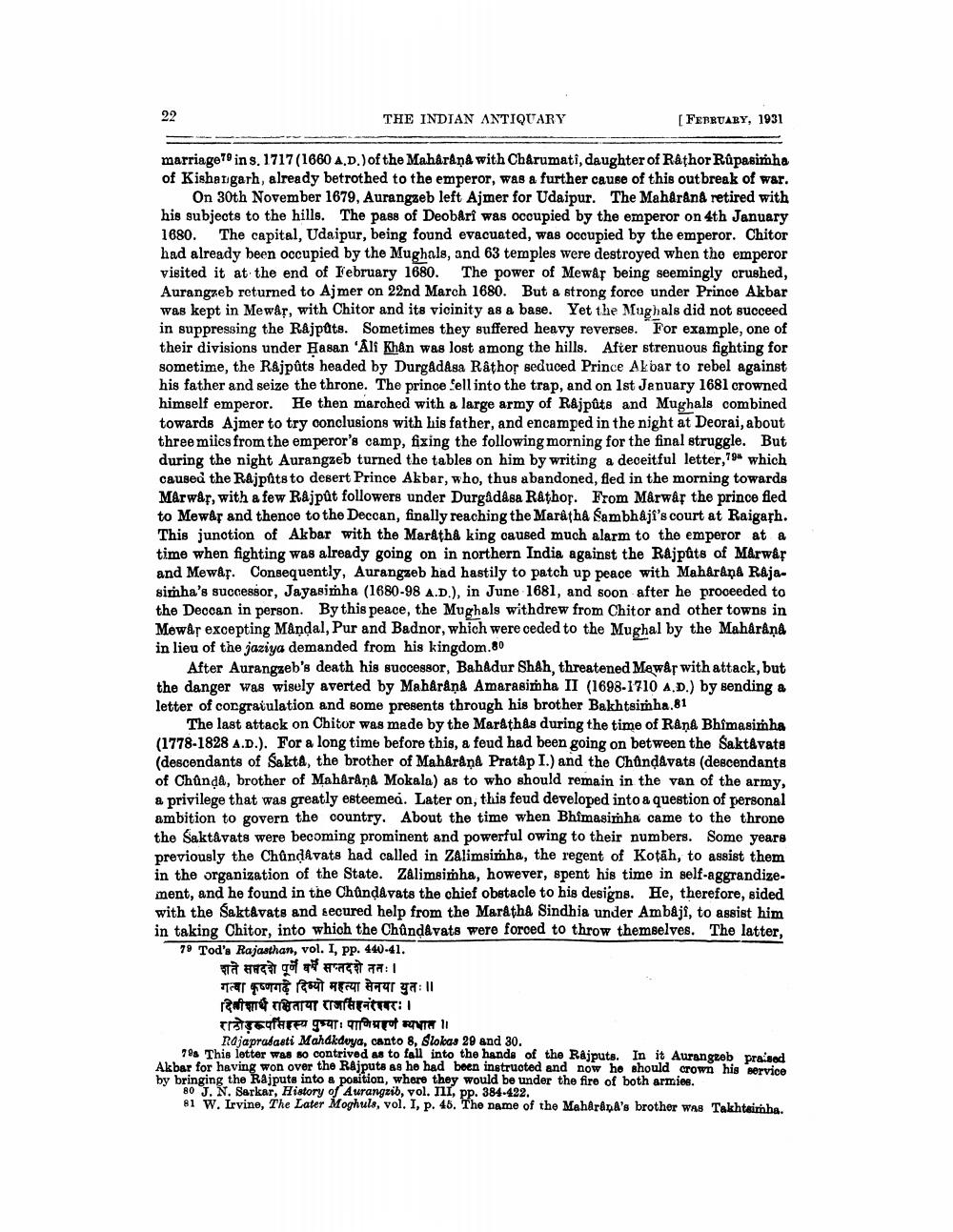________________
22
THE INDIAN ANTIQUARY
[ FEBRUARY, 1931
marriage in s. 1717(1660 A.D.) of the Maharana with Charumati, daughter of Rathor Rûpasimha of Kishangarh, already betrothed to the emperor, was a further cause of this outbreak of war.
On 30th November 1679, Aurangzeb left Ajmer for Udaipur. The Maharanå retired with his subjects to the hills. The pass of Deobari was occupied by the emperor on 4th January 1680. The capital, Udaipur, being found evacuated, was occupied by the emperor. Chitor had already been occupied by the Mughals, and 63 temples were destroyed when the emperor visited it at the end of February 1680. The power of Mewar being seemingly crushed, Aurangzeb returned to Ajmer on 22nd March 1680. But a strong force under Prince Akbar was kept in Mewar, with Chitor and its vicinity as a base. Yet the Mughals did not succeed in suppressing the Rajputs. Sometimes they suffered heavy reverses. For example, one of their divisions under Hasan 'Ali Khan was lost among the hills. After strenuous fighting for sometime, the R&jpûts headed by Durgadása Rathos seduced Prince Albar to rebel against his father and seize the throne. The prince Sell into the trap, and on 1st January 1681 crowned himself emperor. He then marched with a large army of Rajputs and Mughals combined towards Ajmer to try conclusions with his father, and encamped in the night at Deorai, about three miics from the emperor's camp, fixing the following morning for the final struggle. But during the night Aurangzeb turned the tables on him by writing a deceitful letter,794 which caused the Rajpôts to desert Prince Akbar, who, thus abandoned, fled in the morning towards Marwar, with a few Rajput followers under Durgadasa Rathor. From Marwar the prince fled to Mewar and thence to the Deccan, finally reaching the Maratha Sambhaji's court at Raigarh. This junction of Akbar with the Maratha king caused much alarm to the emperor at a time when fighting was already going on in northern India against the Rajputs of Marwar and Mewar. Consequently, Aurangzeb had hastily to patch up peace with Maharana Rajasimha's successor, Jayasimha (1680-98 A.D.), in June 1681, and soon after he proceeded to the Deccan in person. By this peace, the Mughals withdrew from Chitor and other towns in Mewas excepting Mandal, Pur and Badnor, which were ceded to the Mughal by the Maharana in lieu of the jaziya demanded from his kingdom.80
After Aurangzeb's death his successor, Bahadur Shah, threatened Mewas with attack, but the danger was wisely averted by Mahårána Amarasimha II (1698-1710 A.D.) by sending a letter of congratulation and some presents through his brother Bakhtsimha.81
The last attack on Chitor was made by the Marathas during the time of Rana Bhimasimha (1778-1828 A.D.). For a long time before this, a feud had been going on between the Saktávate (descendants of Sakta, the brother of Maharana Pratap I.) and the Chandavats (descendants of Chûnda, brother of Maharåņ& Mokala) as to who should remain in the van of the army, a privilege that was greatly esteemea. Later on, this feud developed into a question of personal ambition to govern the country. About the time when Bhimasimha came to the throne the Saktåvats were becoming prominent and powerful owing to their numbers. Some years previously the Chûndåvats had called in Zalimsimha, the regent of Koţāh, to assist them in the organization of the State. Zalimsimha, however, spent his time in self-aggrandizement, and he found in the Chandavats the chief obstacle to his designs. He, therefore, sided with the Saktávate and secured help from the Maratha Sindhia under Ambaji, to assist him in taking Chitor, into which the Chûndåvats were forced to throw themselves. The latter, 79 Tod's Rajasthan, vol. I, pp. 440-41.
शते सप्तदशे पूर्ण वर्षे सप्तदशे ततः। गत्वा कृष्णगढ़े दिव्यो महत्या सेनया युतः॥ दिखीशार्थ रक्षिताया राजसिंहनरेश्वरः । राठोड़रूपसिंहस्य पुत्र्याः पाणिग्रहणं म्यधात ॥
Rajaprasasti Mahakdoya, canto 8, Slokas 29 and 30. 788 This letter was so contrived as to fall into the hands of the Rajputs. In it Aurangzeb praised Akbar for having won over the Rajputs as ho had been instruoted and now he should crown his service by bringing the Rajputs into a position, where they would be under the fire of both armies.
80 J. N. Sarkar, History of Aurangzib, vol. III, pp. 384-422. 81 W. Irvine, The Later Moghuls, vol. I, p. 46. The name of the Mahârâna's brother WAB Takhtairha.




